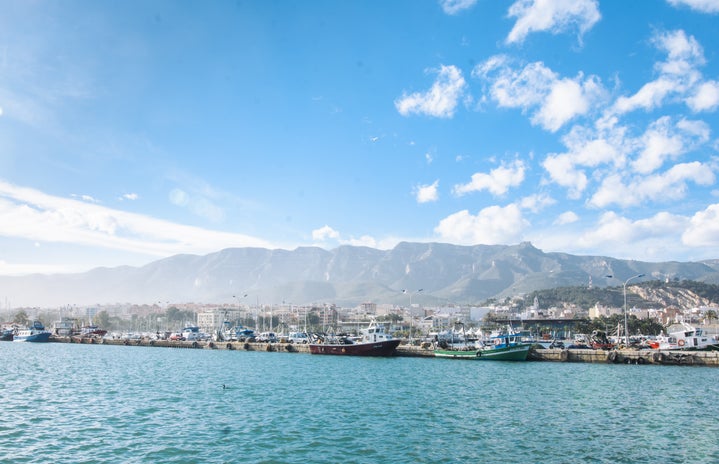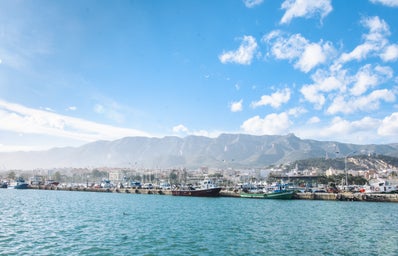Carina Becker has a goal in mind: to compete in The Ocean Race. Becker is from Rye, New York. She is a senior in Boston University’s College of Communication studying advertising and is also a member of BU’s club sailing team.
Becker has been around boats for as long as she can remember because of her family’s rich background in sailing, but she joined the American Yacht Club junior program when she was only 8 years old.

Becker now sails on a Mills 68 named Prospector, where she is the youngest member of the crew and she is in charge of runners, or adjusting the rigging of the boat through maneuvers. On a boat like that, every position is important because things can break so easily and fixes are expensive. It’s also incredibly easy to hurt yourself on the equipment of big boats, so it takes a lot of practice, knowledge, and focus to be a member of the crew. She also sails in the M32 class, where she drives a boat named Young American and has competed in 7 regattas over the course of 2020.
To Becker, sailing is “less of a sport and more of a lifestyle.”
“I decided I wanted to go pro when I was 14,” she said.
She competed in her first big boat event the summer before her freshman year of high school on a boat with her older brother. That was when she started having dreams of a professional sailing career.
To be officially classified as a professional sailor by the World Sailing Organization, the sailing industry has to be your main source of income. But what attracts Becker to the professional sailing world has nothing to do with money. She is drawn to the community.
“You know people around the world,” Becker said. “You could meet someone on the streets of Newport and realize that you both know the same person in Australia.”
But, at the same time sailing is “a game of reputation.” Everyone knows if you’re a good sailor and if you’re the type of person they might want on their boat.
“Figuring out how to be in that circle and have people know your name and have something attached to your name is really hard,” said Becker. “You have to be able to connect with the people around you. You have to jump on every opportunity you get. You have to keep on thinking that each door and each little thing is really important because all those pieces of sandpile up fast.”

“To get those phone calls and opportunities, you have to be there,” she said. “If you aren’t there, you could miss out on competing in the event or meeting the person that could change your whole career.”
Part of the problem with always being present and waiting for those opportunities is balancing sailing with school.
Over time, she has realized that what she is doing in school can be relevant to the sailing world. “I know there are job opportunities that are more than trimming a sail and taking down a kite and calling tactics,” she said.
Becker also struggles with being female in a predominantly male sport and said that she has to work twice as hard as her male peers. “Unless you can say you’re the best at what you do,” the chances of being taken as a girl versus a boy are just lower.
“There are boats I know that probably just wouldn’t even take a girl,” she said.
Becker said that the issue begins with junior sailing, as girls are not encouraged to sail from a young age.
“It’s something you see even in college sailing, where the crews are predominantly female and the drivers are predominantly male,” she said. “It’s definitely hard [being a girl], but it’s also hard for a guy. Everyone in pro sailing has worked their ass off.”
One of Becker’s biggest role models is her aunt, Courtenay Becker, who won a bronze medal in the 2000 Olympics, sailed in America’s Cup, and almost competed in the Whitbread Around the World Race, which we now call The Ocean Race.
“It was a time in sailing where if you were a girl the only way you were on a boat was if you were the owner’s daughter or the cook,” Becker said. “Being a woman in sailing wasn’t easy, so being related to her is definitely inspiring.”
There are also significant differences between college sailing and the kind of sailing she wants to do professionally. Where college sailing is small boats sailing on small courses focusing on small details in and out of the boats, pro sailing deals with big boats with large crews where every person’s job is important. Big boat gains aren’t visible as quickly as they are in college sailing.
“It’s two different worlds,” Becker said. “The drive on a college sailor and the drive on a distance sailor is very different because your brain works differently.”
The pressure on the crew of a big boat is immense because they need to understand every part of the boat in case the boat captain asks them to switch positions with someone else. One mistake can cost hundreds of thousands of dollars, so there is significant pressure on the crew to make sure nothing breaks.
“If you mess up on the water you might lose your job when you come in,” said Becker.
Part of the reason it’s so hard to gain experience as a young big boat sailor is because boat captains have to make the decision to give kids experience at the risk of making expensive mistakes.
“The mentality of crossing your t’s and dotting your i’s, that is big boat sailing,” Becker said “People notice when you look the other way and when you don’t pull your weight in the boat. The little things add up.”
“When you’re taking care of a boat that is your lifeline, that is your home, that is your job, you have to cross your t’s and dot your i’s,” Becker said.
Becker has competed in distance races offshore, and coastal races which are smaller scale but still competitive and well-known. At 21 years old, she has competed in 2 Newport Bermuda races, has done multiple ocean passages delivering boats, and has competed in the Rolex Sydney Hobart race, all for a total of almost 5,000 offshore nautical miles. Her longest sail was a boat delivery from West Palm, Florida to Baltimore, Maryland, which lasted 5 days. She completed her first ocean passage the summer after her freshman year of high school.
She is most proud of her performance in the Rolex Sydney Hobart race — an offshore race from Australia to Tazmania —because of its prestige in the big boat sailing world.

“You are going into locations where you might not be able to get help,” Becker said.“You’re putting yourself in a situation where it can get bad.”
Knowing what to do when things go wrong is imperative because situations that aren’t life-threatening can become life-threatening very quickly if they aren’t handled properly.
Becker has never seen anyone get seriously hurt in her experience, but the job is no less physically and mentally demanding. One of the biggest challenges in offshore racing is learning how to take care of the boat as well as your own health, but “it’s all worth it.”
“When you’re out in the ocean actually doing the sailing, it’s unbelievable,” Becker said. You’re experiencing something where only a fraction of the population gets to see those waters and experience that lifestyle. It’s really special.”
To learn more about professional sailing, visit www.sailing.org.
Want to keep up with HCBU? Make sure to like us on Facebook, follow us on Instagram, check out our Pinterest board, and read our latest Tweets!



